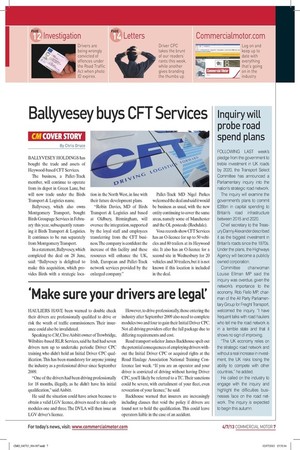'Make sure your drivers are legal' HAULIERS HAVE been warned
Page 5

If you've noticed an error in this article please click here to report it so we can fix it.
to double check their drivers are professionally qualified to drive or risk the wrath of traffic commissioners. Their insurance could also be invalidated.
Speaking to CM, Clive Aisbitt owner of Trowbridge, Wiltshire-based RLR Services, said he had had seven drivers turn up to undertake periodic Driver CPC training who didn't hold an Initial Driver CPC qualification. This has been mandatory for anyone joining the industry as a professional driver since September 2009.
"One of the drivers had been driving professionally for 18 months, illegally, as he didn't have his initial qualification," said Aisbitt.
He said the situation could have arisen because to obtain a valid LGV licence, drivers need to take only modules one and three. The DVLA will then issue an LGV driver's licence. However, to drive professionally, those entering the industry after September 2009 also need to complete modules two and four to gain their Initial Driver CPC. Not all driving providers offer the full package due to differing requirements and cost.
Road transport solicitor James Backhouse spelt out the potential consequences of employing drivers without the Initial Driver CPC or acquired rights at the Road Haulage Association National Training Conference last week. "If you are an operator and your driver is convicted of driving without having Driver CPC, you'll likely be referred to a TC. Their sanctions could be severe, with curtailment of your fleet, even revocation of your licence," he said.
Backhouse warned that insurers are increasingly including clauses that void the policy if drivers are found not to hold the qualification. This could leave operators liable in the case of an accident.









































